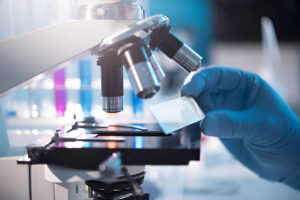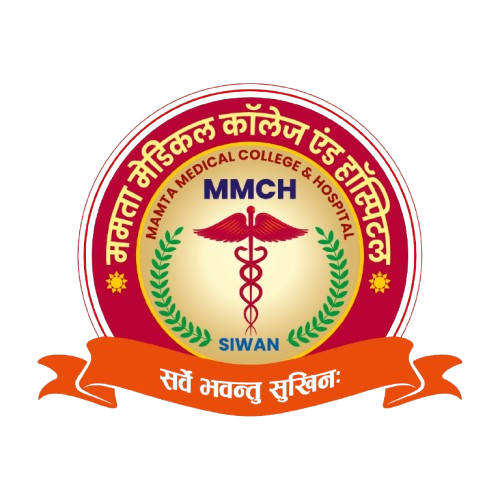
🧬 Department of Pathology
Mamta Medical College & Hospital, Siwan (MMCH)
The Department of Pathology at Mamta Medical College & Hospital, Siwan, is a vital bridge between the basic medical sciences and clinical practice. As a core discipline in the second professional MBBS curriculum, pathology provides a deep understanding of the mechanisms behind disease development and progression. It lays the foundation for diagnostic medicine and enables students to connect theoretical knowledge with practical application in clinical settings.
With well-equipped laboratories, experienced faculty, modern teaching aids, and a patient-centered approach, our department fosters analytical reasoning, diagnostic skills, and research orientation among future doctors. The department is fully compliant with National Medical Commission (NMC) guidelines and actively contributes to competency-based education and integrated learning.
🧠 What is Pathology?
Pathology is the study of diseases — their causes, mechanisms, structural and functional changes, and the consequences of those changes. It forms the scientific basis for clinical medicine and serves as the foundation for diagnostics, including histopathology, cytopathology, hematology, and clinical pathology.
A deep understanding of pathology allows medical students to:
Identify and classify diseases accurately
Interpret laboratory and diagnostic reports
Understand disease progression and prognosis
Bridge the gap between symptoms and diagnosis
Communicate findings effectively with clinicians
At MMCH Siwan, the department ensures that students are trained not only to master disease mechanisms but also to apply this knowledge in real-life clinical decision-making.
🏥 Department Highlights
NMC-compliant modern infrastructure
Advanced Histopathology, Cytopathology, Hematology, and Clinical Pathology laboratories
Separate museum with hundreds of disease specimens
Slide banks, charts, photomicrographs, and interactive models
Well-furnished lecture halls and demo rooms with digital AV aids
Integration with hospital laboratory for real-time diagnostic exposure
🔬 Laboratories & Infrastructure
The Department of Pathology boasts state-of-the-art laboratories that facilitate practical learning, hands-on skill development, and diagnostic training.
🔹 Histopathology Lab
Tissue processing, embedding, section cutting, and staining (H&E, special stains)
Equipped with rotary microtomes, tissue processors, hot plates, and water baths
Microscopy sessions to study benign and malignant tumors, inflammatory lesions, and degenerative conditions
Emphasis on correlation with gross pathology and clinical features
🔹 Hematology Lab
Complete blood count (CBC), peripheral smear examination, ESR, PCV, and reticulocyte count
Cell counters, hemoglobinometers, and coagulation equipment
Identification of anemia, leukemia, infections, and bleeding disorders
Morphology-based diagnosis and lab interpretation skills
🔹 Cytopathology Unit
Pap smear, FNAC (Fine Needle Aspiration Cytology), fluid cytology
Microscopy-based identification of pre-cancerous and cancerous lesions
Clinical relevance of cytodiagnosis, especially in gynecology and oncology
🔹 Clinical Pathology Lab
Urine examination, stool microscopy, semen analysis, and body fluid analysis
Training in recognizing pathological findings and report writing
Use of centrifuge, urinometers, and microscopes
🔹 Pathology Museum
Over 200 preserved gross specimens with detailed case descriptions
Mounted displays of tumors, inflammatory diseases, congenital anomalies, and organ pathology
Facilitates self-directed learning and case-based discussions
📘 Academic Curriculum
The MBBS pathology curriculum at MMCH spans across the third to fifth semesters (2nd professional MBBS year) and is taught as per CBME (Competency-Based Medical Education) framework recommended by NMC.
Major Topics Covered:
General Pathology – Cell injury, inflammation, healing, thrombosis, neoplasia, amyloidosis
Systemic Pathology – Diseases affecting organs like the heart, lungs, kidney, liver, GIT, CNS, endocrine system, etc.
Hematology – Anemias, leukemias, bleeding disorders, blood cell morphology
Clinical Pathology – Urine, stool, CSF, and body fluid analysis
Cytopathology & Histopathology – Principles and interpretation
Basics of Immunopathology & Molecular Pathology
🎯 Teaching Methodologies
The department uses a student-centered and clinically oriented teaching approach combining theory with hands-on practice. Innovative and interactive teaching-learning methods include:
📚 Lectures with visual aids, animations, and clinical relevance
🧑🤝🧑 Small Group Discussions (SGDs) and tutorials for problem-solving
🏥 Clinico-pathological correlation (CPCs) in collaboration with clinical departments
🧪 Practical sessions for staining, microscopy, and specimen analysis
📑 Case-based learning (CBL) for understanding disease presentations
📊 Seminars & student presentations to develop analytical and communication skills
📝 Formative & summative assessments using OSPE, viva, spotters, and theory exams
🧪 Diagnostic & Clinical Services
The department is actively involved in hospital-based diagnostic services to ensure that students witness and understand real-time disease diagnosis.
Clinical Services Offered:
Histopathology biopsy and surgical pathology reporting
FNAC procedures and slide interpretation
Cytology for PAP smears and fluids
Routine and special hematological tests
Urine and stool testing in clinical pathology
Correlation of lab findings with clinical symptoms
Students observe, assist, and interpret diagnostic reports under supervision, thereby developing skills essential for future clinical practice.
📊 Research & Academic Enrichment
The Department of Pathology encourages research activities, especially among undergraduates. Students and faculty are involved in:
Clinico-pathological correlation studies
Histopathological pattern analysis
Hematological disorder prevalence studies
Publishing research papers in indexed medical journals
Participating in national and regional pathology conferences
An Institutional Ethics Committee (IEC) supports ethical research practices.
🧬 Skill Development & Career Relevance
Studying pathology at MMCH equips students with:
Diagnostic reasoning
Specimen processing techniques
Microscopic identification skills
Laboratory report writing
Understanding of disease prognosis and planning treatment
Foundations for careers in pathology, internal medicine, oncology, and more
Our goal is to nurture future physicians, surgeons, pathologists, and diagnosticians with deep scientific acumen and practical expertise.
🌐 Department Vision
To develop into a Center of Excellence in Pathology Education, Research, and Diagnostics, providing evidence-based and ethical training to undergraduate medical students and contributing to better healthcare outcomes.
